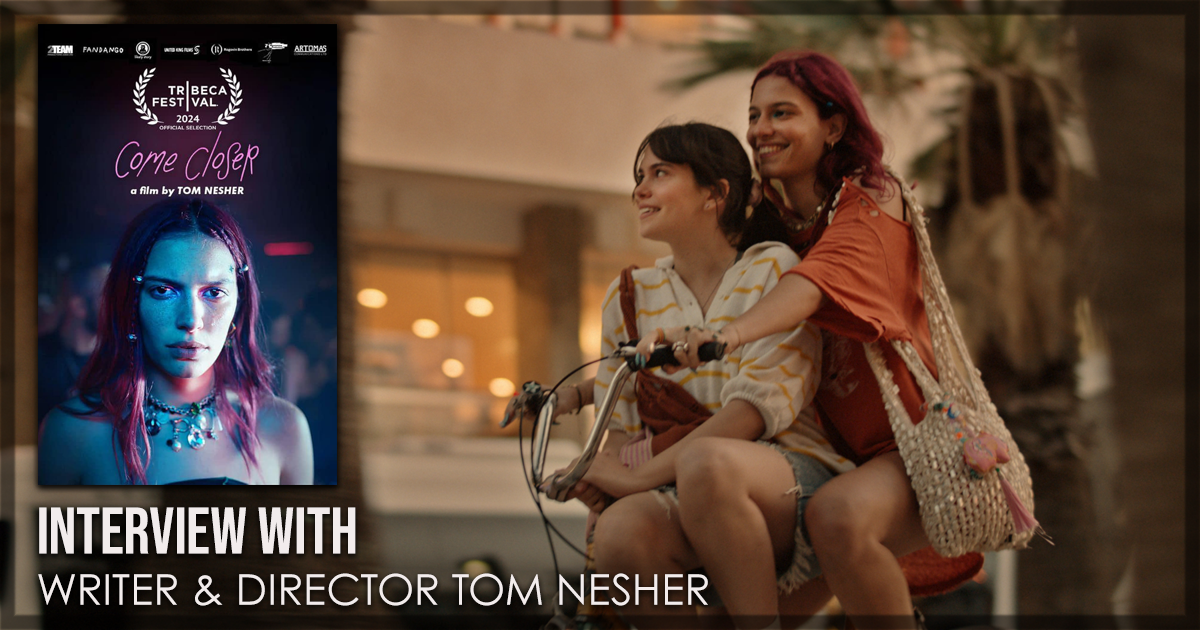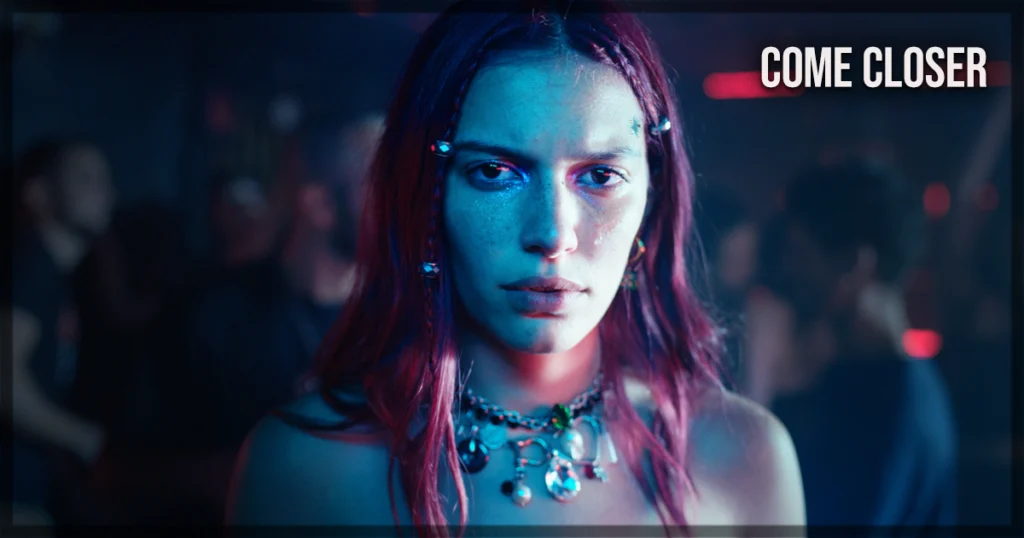In recent years, there have been many stories about romances between women, but Tom Nesher’s Come Closer is a bit different than what we have seen. In this story of love, grief, and friendship, we see Eden (Lia Elalouf) dealing with the difficult situation of losing her brother in an accident. However, she realizes that there is something that her brother never told her, and that information is that he had a girlfriend named Maya, played by Daria Rosen. She tends to follow her and get to know more about their relationship. As time progresses, Eden spends time with Maya and gets to know her well, falling in love with her. However, what happens next is a brilliant and tumultuous ride of emotions and how people find love in hopeless places.
Directed by Tom Nesher, Come Closer is a mesmerizing and heartbreaking tale of human conditions. Although it seems that Nesher told this story effortlessly, it took her a lot of courage to make this film. After its premiere at this year’s Tribeca Film Festival, we got a chance to talk to with the creative over Zoom about stitching such an emotional story about love and sorrow. She opened up about how debutantes Lia Elalouf and Daria Rosen made the process of making this film such a rewarding experience. Read ahead for the full interview.
The Interview with Come Closer Writer and Director Tom Nesher
[Editor’s Note: This interview has been lightly edited for clarity.]
Aayush Sharma: Congratulations on the movie, Tom. A brilliant and poignant movie about relationships, sorrow, and grief. So, I would like to ask, what inspired you to create the story of Come Closer and how did the concept of exploring grief through Eden’s journey come about?
Tom Nesher: I started working on the script five years ago, my brother passed away in a car accident and I knew I wanted to make a film since I was a child. So that was something that I knew I wanted to pursue. I started writing after the accident happened, but I knew I wanted to write something fun, sexy, and provocative. And like this love triangle story, I didn’t want to write like a family drama, I wanted to make a film that my brother would love, a film that I would love to watch. Then I started writing about these two characters who meet in these very strange circumstances. But they’re just teenagers who are becoming adults and becoming like the people who are going to be exploring Tel Aviv, sexuality, friendship, exploring it all together.
Aayush Sharma: The movie is not just about women experiencing grief, they have their ways to deal with it, but it’s also about them exploring their sexuality. So, how important it was for you to show their journey from being completely unknown to each other, or even hating each other to a relationship that was raw and authentic?
Tom Nesher: I loved going through that whole journey of their relationship to see them from the very beginning, where they’re stressed by each other and they are intimidated by each other. And then to see them coming closer throughout the film. And it was just really magical also to work with these two actresses because it’s their first time ever doing a film or anything else or anything on acting. They’re both very young, and they were so trusting and amazing. I feel like their relationship in real life really resembles the dynamic that the characters have. So it was really special.
Aayush Sharma: After watching the film, I shared my reaction on social media, saying that Come Closer was the first movie at this year’s Tribeca that brought me to tears. It made me reflect on my own experience of losing a loved one or loss I’ve come to terms with but still carry within me. It felt incredibly personal and authentic, could you share the experiences or insights you drew from to create such a genuine and heartfelt story?
Tom Nesher: I know that it’s very important for me to have some connection to the audience that has lost people they love because this is a very universal thing. Even if this film happens in Tel Aviv, and Hebrew, I feel like it can connect to people who are going through grief anywhere. And I can say that, for me personally, I felt like the people around me tried to make me like run away from grief and not tackle it too much and just like to move on.
Tom Nesher: It was really impossible for me and I felt like the best thing I could do is to take a really deep dive into love and this story. And this this film, it was my lifeline and my dive into this relationship. And I feel like the characters in the film are doing the exact same thing of not running away from it but running into it and going through it and not around it because to be on the other side. You have to go through it.
Aayush Sharma: You are working with two fresh faces and debutantes such as Lia and Daria. They both are the soul of this film and make viewers understand grief, love, and what emotions look like. So, what was the casting process for the roles? And were Lia and Darya, the first choices for their respective roles?
Tom Nesher: The casting process was amazing. I felt like I was really looking for people and not for actors. So, I was doing just conversations, very personal conversations with each actor and actress just trying to figure out what kind of people they are. And Lia and Daria, besides the fact that they’re amazing actresses, and they did an amazing job in the film, were also the most interesting people for these roles. I felt like they added a lot to their characters, we had four months of rehearsals, which is a lot. We improvised on every scene and they brought in a lot of their own identity, which was very special.
Aayush Sharma: Your characters are really different from each other. One has a free spirit, but the other one is shy. However, they both have emotions, bottled up in them. There’s something really authentic about how Daria’s character falls in love with Eden. She saw something in her that others didn’t, I wanted to know why you decided to make the main character so different yet so similar in some ways.
Tom Nesher: I feel like the main character is just like a Tiger. While the other character, Daria’s character, is more like a bunny. And the tiger, you know, you can’t tame it, it’s wild. And it has to be this wild to go throughout this journey. So, it’s really just fun to be around with. I felt while I was casting that I’m casting a tiger and a bunny, and I needed to find them in nature. Like I can’t turn a cat into your Tiger, I have to find a real tiger.
Tom Nesher: When I found Lia and Daria, these are the people they really are in life, they really are a tiger and a bunny. And, it was so special to see these two characters learn to live together because we would assume that the tiger would eat up the bunny and it would end up very bad. But there was there’s also a lot of love for that bunny.
Aayush Sharma: Another thing that makes this movie so beautiful is the cinematography. You know, what was your vision for the visual style of this film? And how did you collaborate with Shai Peleg?
Tom Nesher: Working with Shai was really great. I had like a whole vision and a lot of references I wanted for this film. And I was like walking around with my iPad and showing everyone like this should be the lighting. This should be the frame size, like everything was very constructed. But then Shai just brought into the film, so much freedom and soul and he was just fearless. We had a very small budget, and he was also wild, but also very generous in the way that he, for example, the first shot of the film, he just shot it on a skateboard, like with nothing holding the camera beside him just going on a skateboard throughout Tel Aviv for this very long shot. So he was so free and experimental and was willing to go with my dreams. And I’m very grateful for having him.
Aayush Sharma: One thing that struck me while watching one of the scenes and what was happening in Israel at that time. In the footage, we saw protests that were happening in Israel, So was there any particular thing in your head while you were using that kind of footage, because the story is not related to what’s happening? So what was the idea behind using that for foothills?
Tom Nesher: So this scene for me, I feel like it’s very important in the film, even though it’s just like, between other big scenes, because it shows how you can have like, the greatest drama of the country, of the world happening. But if you’re a teenager in love, it’s just like, in the background, it’s like the most dramatic things can happen, but you’re texting, and that’s the most important thing. I feel like just giving the characters debility to, like, their emotions are so valid, that this is the most important thing in the world. And the Holocaust is just the background, which is insane. You know, my grandmother is a Holocaust survivor, and of course, it’s not to minimize in any way the impact of the Holocaust, but the fact that they could be so much in their own world was very interesting to me.
Aayush Sharma: How has creating Come Closer impacted you personally? Did working on this project change your perspective?
Tom Nesher: It did, it really changed my perspective, deeply. I feel like I couldn’t have gone through the grief that I’m going through still, you know, it never ends. But it really saved my life in a certain way, I really feel like to be able to see beauty in life, and to appreciate the passion I have in life, and that’s for sure because of the film.
Aayush Sharma: What message or reflections or, you know, grief and loss did you hope to convey or even story?
Tom Nesher: Yes, so I won’t give in the story, of course. But since you saw the film, you know, the last scene. And I feel like the last scene says that throughout the whole film is like if you love someone set them free and you want the character to set her brother free and to set Maya free and to let them just continue and for her to continue also, but then if they love you back, you will find them by your side.
Tom Nesher: So I feel like she finds that love is still within her and by her side and that she doesn’t need to hold on to love because it’s just something that is naturally hers. I feel like the last scene of the film really could have a phase that feeling of having him forever, without trying or without bringing force or aggressiveness into it. It’s just who you are. Your love is yours forever.
Come Closer recently screened at the Tribeca Film Festival, where it won the Viewpoints Award.
You can find out more information about the film at the Tribeca website for the title.


